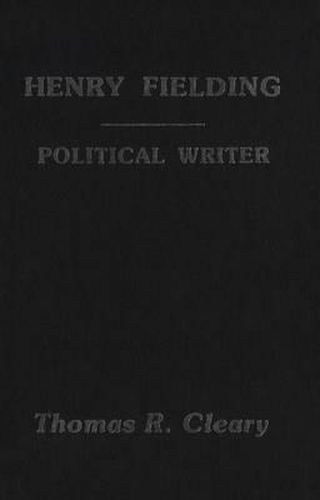Readings Newsletter
Become a Readings Member to make your shopping experience even easier.
Sign in or sign up for free!
You’re not far away from qualifying for FREE standard shipping within Australia
You’ve qualified for FREE standard shipping within Australia
The cart is loading…






An accurate and comprehensive study of the political aspects of Fielding’s art has been sorely needed. As a result of decades of work by literary scholars and a series of great historians, such a study is finally possible. This volume addresses that need, and, in the light of a recent revival of interest in Fielding’s work, it arrives most opportunely. The author offers here a wide-ranging focus and a firm grip on the shifting complexities of Fielding’s political situations–the loyalties and enmities, factional alignments and fractious rhetoric–that allow the satisfactory understanding of Fielding’s political writing. Political writing in Fielding’s day, as in ours, was topical, concerned with evanescent problems and day-to-day needs that were familiar to contemporaries, but that are now recaptured only with greatest difficulty. This study constitutes a thorough reconstruction of Fielding’s political context and extricates from the context Fielding’s own political endeavours. Cleary’s work will make many of Fielding’s previously unstudied works accessible to students and scholars of eighteenth-century English literature. A necessary point of reference to both literary specialists and historians concerned with eighteenth-century England.
$9.00 standard shipping within Australia
FREE standard shipping within Australia for orders over $100.00
Express & International shipping calculated at checkout
An accurate and comprehensive study of the political aspects of Fielding’s art has been sorely needed. As a result of decades of work by literary scholars and a series of great historians, such a study is finally possible. This volume addresses that need, and, in the light of a recent revival of interest in Fielding’s work, it arrives most opportunely. The author offers here a wide-ranging focus and a firm grip on the shifting complexities of Fielding’s political situations–the loyalties and enmities, factional alignments and fractious rhetoric–that allow the satisfactory understanding of Fielding’s political writing. Political writing in Fielding’s day, as in ours, was topical, concerned with evanescent problems and day-to-day needs that were familiar to contemporaries, but that are now recaptured only with greatest difficulty. This study constitutes a thorough reconstruction of Fielding’s political context and extricates from the context Fielding’s own political endeavours. Cleary’s work will make many of Fielding’s previously unstudied works accessible to students and scholars of eighteenth-century English literature. A necessary point of reference to both literary specialists and historians concerned with eighteenth-century England.